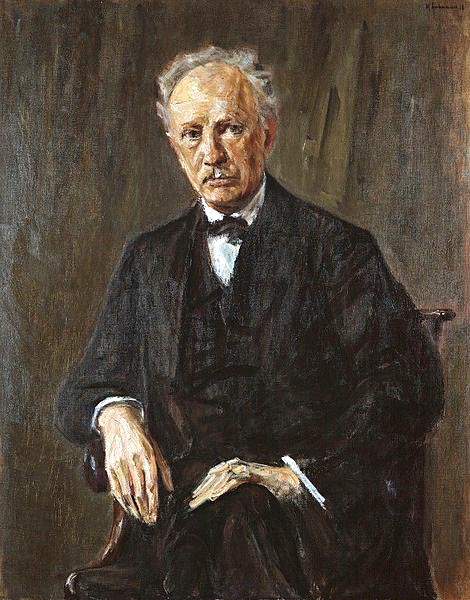 |
| Richard Strauss (Wikipedia) |
Note: This great composer wouldn't be on the radar of most of us were it not for a couple of "classical pops" numbers still played today--especially the one from that space movie.
Get Ready: Have you ever listened to Also sprach Zarathustra all the way through? If so, what was it like? (If not, do it!) Try Till Eulenspiegel's Merry Pranks, too--lots of fun!
Anyone who has seen 2001: A Space Odyssey will remember the scene in which a monolith is viewed to the strains of long, drawn-out notes, each louder than the last: "daaaaa, Daaaaa, DAAAAAAA -- DA DAAAAA!" followed by the sound of banging timpani drums.
This was the work of German composer Richard Strauss (1864-1949). Though many considered him the greatest composer of the first half of the 20th century, Strauss (not to be confused with the Viennese "Waltz King" Johann Strauss II) said of himself: "I may not be a first-rate composer, but I am a first-class second-rate composer."
He was more than that. His operas such as Der Rosenkavalier and Salome are still widely performed. And the above-mentioned tone poem, named Also sprach Zarathustra (inspired by a philosophical novel written by the German philosopher Friedrich Nietzsche), is a staple of classical pops performances, as is the delightful Till Eulenspiegel's Merry Pranks.
Strauss wrote music in the Romantic style, drawing on folk culture and the influence of nature to present sounds pleasing to a wide audience.
His father was a professional musician, who taught his son well. Young Richard wrote his first composition at age six, and he continued composing well into his eighties. As a boy, he was heavily influenced by performances of music by the great Richard Wagner (1813-1883), though his father did not approve of Wagner's style, finding it too "modern."
The first public performance of Strauss's work took place in Vienna when he was only 18. In this performance he played the piano, though he was to have a long career as a conductor of his own music and that of others.
In 1894 he married a soprano, Pauline de Ahna, and they had one son, who himself married a Jewish woman in 1924. This was to cause the family some awkwardness when the Nazis took power. Strauss found himself cooperating with the Nazis in minor ways in order to protect his family.
Nevertheless, he wrote to a friend in 1935: "Do you believe I am ever, in any of my actions, guided by the thought that I am 'German'? Do you suppose Mozart was consciously 'Aryan' when he composed? I recognize only two types of people: those who have talent and those who have none."
--------Read more: https://en.wikipedia.org/wiki/Richard_Strauss
Practice: Match the term to its definition below:
- Aryan
- awkwardness
- classical pops
- conductor
- cooperating
- monolith
- soprano
- staple
- timpani
- waltz
- a woman who sings in the highest range
- working with
- difficulty; embarrassment
- kettle drums; a large drum that can be tuned to different musical notes
- a song written in 3/4 time, and the dance that goes with it
- to the Nazis, a non-Jewish white person, especially one that is blond and blue-eyed
- a large stone, usually standing upright
- serious music recognized and enjoyed by many people
- a person who leads an orchestra
- the standard, main food item eaten (like rice in the Chinese diet)
Answers are in the first comment below.
Submitted to the Shenzhen Daily for May 12, 2015


Answers to the Practice: 1. f; 2. c; 3. h; 4. i; 5. b; 6. g; 7. a; 8. j; 9. d; 10. e
ReplyDelete